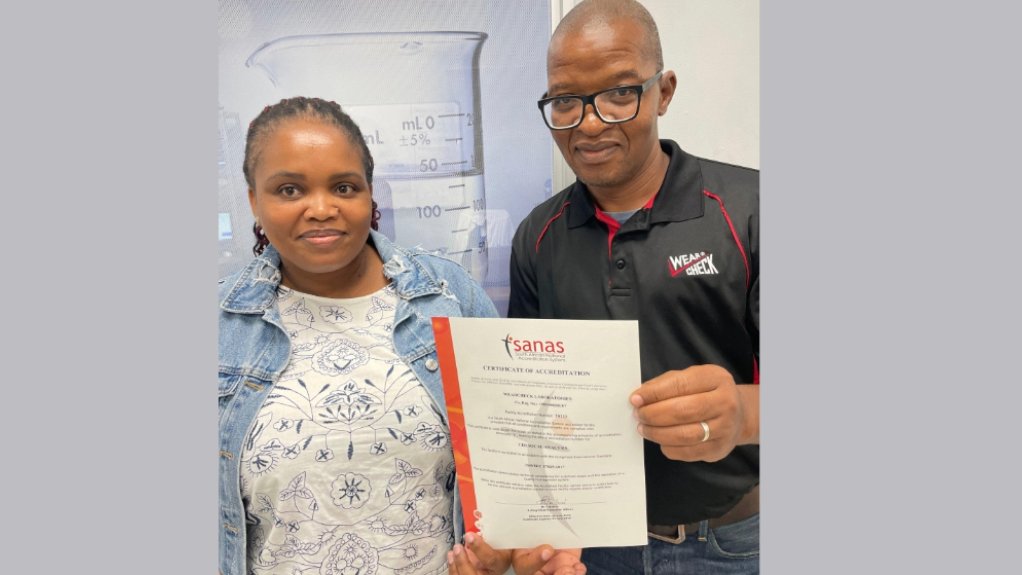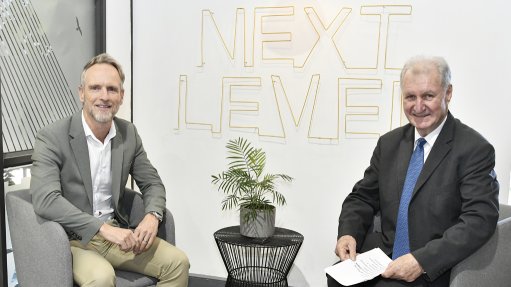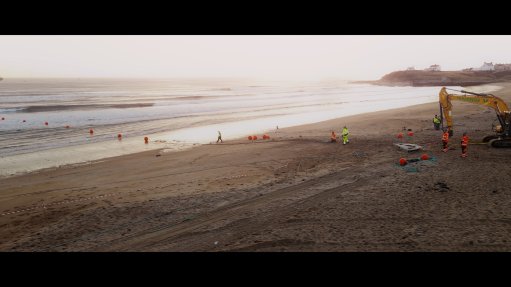WearCheck Water first with official AdBlue®/ DEF analysis accreditation
This article has been supplied.
( Virtual Showroom )WearCheck Water - one of the condition monitoring specialist company’s divisions - recently became the first laboratory in Africa to be officially ISO17025 accredited to test AdBlue®/ DEF (diesel exhaust fluid) by the South African National Accreditation System (SANAS).
This latest achievement is added to WearCheck Water’s other accreditations – the company already has ISO17025:2017 accreditation for chemical and microbiological water analysis.
WearCheck Water’s AdBlue®/ DEF-analysis accreditation means that the company can test AdBlue®/ DEF solutions to make sure that Adblue manufacturers meet the required ISO 22241 standards. This analysis service will assist AdBlue®/ DEF manufacturers and users, OEMs, fuel depots, and large-scale truckers/ fleet managers.
SANAS is the only national body in South Africa that is responsible for carrying out accreditation of various entities, including laboratory testing, the relevant section which regulates WearCheck’s laboratory services.
General manager of WearCheck Water, Thelma Horsfield, is proud of the company’s ISO17025 achievements. ‘AdBlue®, a form of Diesel Exhaust Fluid (DEF), helps to reduce harmful emissions (Nox, or nitrogen oxide), and is added to diesel engines. It is not a fuel additive and is not added to the fuel tank of a vehicle. AdBlue® is a colourless, non-toxic liquid that converts pollutants into gases which do not harm the environment.
‘AdBlue® is used in vehicles with Selective Catalytic Reduction (SCR) technology. It is a 32,5% solution of high-purity, synthetically manufactured urea in de-mineralised water, and is safe to use.
‘Vehicles with SCR technology have a separate tank filled with AdBlue®/DEF, which is injected into the exhaust pipe, in front of the SCR catalyst, downstream of the engine. Heated in the exhaust, it decomposes into ammonia and CO₂. When the NOx from the engine exhaust reacts inside the catalyst with the ammonia, the harmful NOx molecules in the exhaust are converted to harmless nitrogen and water, which are released from the exhaust pipe as steam.
‘Adblue®/DEF solutions are made up to ISO 22241 standards to ensure that the mixtures are created correctly and do not harm engines,’ she said.
Moses Lelaka, technical manager for WearCheck Water, was instrumental in setting up and implementing the testing process, along with the company’s quality manager, Lorato Hotane.
Lelaka explains, ‘We offer an analysis service that includes testing titrimetric (alkalinity), gravimetric (insoluble matter), colorimetric (biuret and aldehydes), as well as the ionisation (metals). After investing in a refractometer for our laboratory, we are already conducting the tests in our Johannesburg laboratory, and will be extending the service to our Cape Town laboratory soon.’
Lelaka offered these tips for taking an Adblue® sample. ‘Sample containers should be made of materials compatible with urea solutions, typically high-density polyethylene (HDPE) or stainless steel, and must be sealed properly to avoid contamination.
‘The sampling container must not have any previous chemical residues, and it should be rinsed with distilled or deionised water before use. The sample must be representative of the entire batch, and avoid areas with potential sediment or contamination. Open the valve, allowing the initial few litres to flow out, discarding it to remove any residual contamination from the sampling point. Fill the container, seal and label it, and store it in a cool, dry place until it is tested.
‘The sample will be tested for compliance with ISO 22241 standards, checking for properties like urea concentration, alkalinity, biuret content, and other contaminants.
Article Enquiry
Email Article
Save Article
Feedback
To advertise email advertising@creamermedia.co.za or click here
Comments
Press Office
Announcements
What's On
Subscribe to improve your user experience...
Option 1 (equivalent of R125 a month):
Receive a weekly copy of Creamer Media's Engineering News & Mining Weekly magazine
(print copy for those in South Africa and e-magazine for those outside of South Africa)
Receive daily email newsletters
Access to full search results
Access archive of magazine back copies
Access to Projects in Progress
Access to ONE Research Report of your choice in PDF format
Option 2 (equivalent of R375 a month):
All benefits from Option 1
PLUS
Access to Creamer Media's Research Channel Africa for ALL Research Reports, in PDF format, on various industrial and mining sectors
including Electricity; Water; Energy Transition; Hydrogen; Roads, Rail and Ports; Coal; Gold; Platinum; Battery Metals; etc.
Already a subscriber?
Forgotten your password?
Receive weekly copy of Creamer Media's Engineering News & Mining Weekly magazine (print copy for those in South Africa and e-magazine for those outside of South Africa)
➕
Recieve daily email newsletters
➕
Access to full search results
➕
Access archive of magazine back copies
➕
Access to Projects in Progress
➕
Access to ONE Research Report of your choice in PDF format
RESEARCH CHANNEL AFRICA
R4500 (equivalent of R375 a month)
SUBSCRIBEAll benefits from Option 1
➕
Access to Creamer Media's Research Channel Africa for ALL Research Reports on various industrial and mining sectors, in PDF format, including on:
Electricity
➕
Water
➕
Energy Transition
➕
Hydrogen
➕
Roads, Rail and Ports
➕
Coal
➕
Gold
➕
Platinum
➕
Battery Metals
➕
etc.
Receive all benefits from Option 1 or Option 2 delivered to numerous people at your company
➕
Multiple User names and Passwords for simultaneous log-ins
➕
Intranet integration access to all in your organisation




















